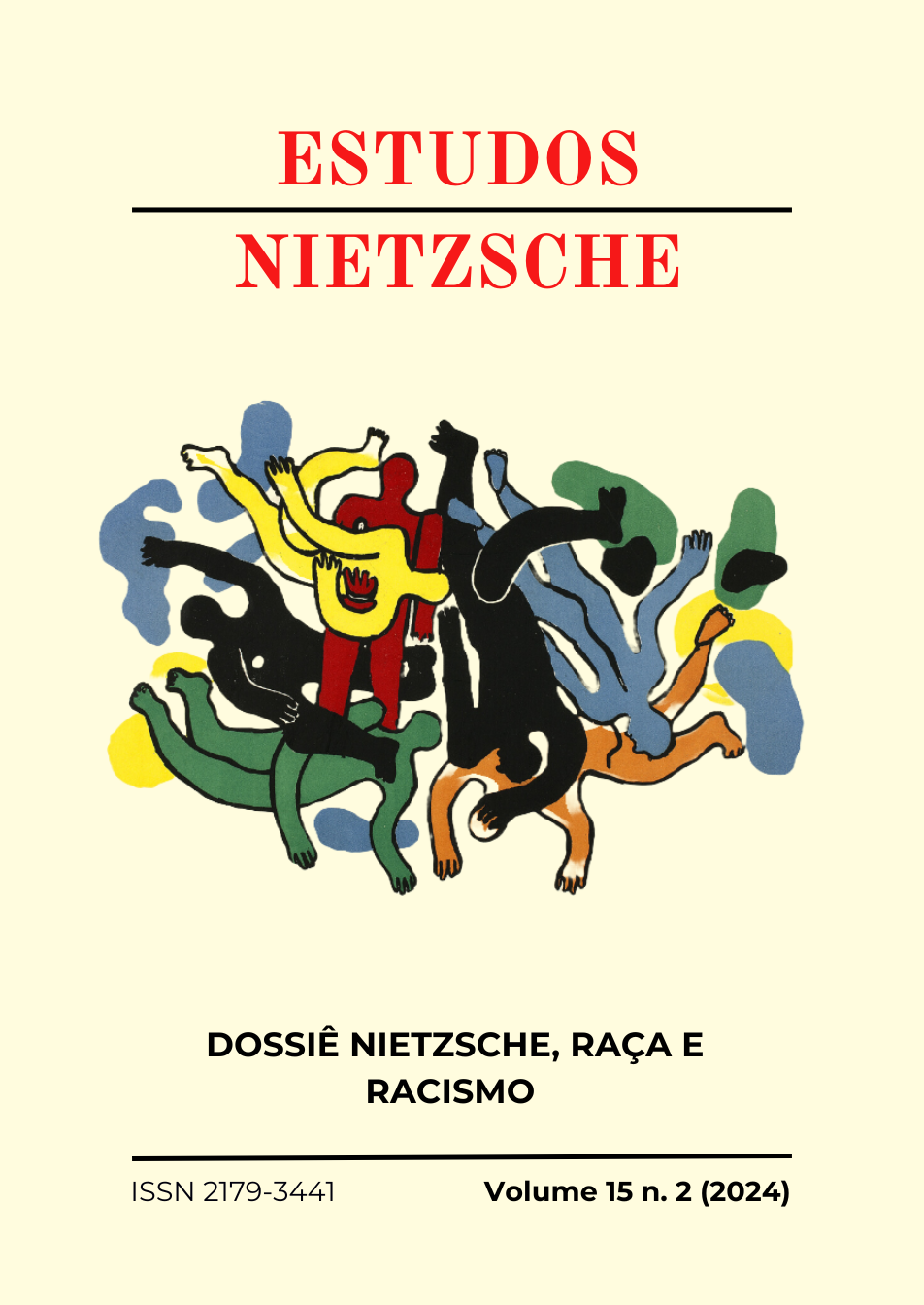O perfilamento racial em Nietzsche
DOI:
https://doi.org/10.47456/en.v15i2.47384Keywords:
Raça, Racismo, Cultivo seletivo, Europa, Fisiologia, Classe, JudeusAbstract
This paper aims to map the different notions of race Nietzsche employs throughout his oeuvre. I examine his varying definitions of the term and whether it has, according to Nietzsche, any use in the cultural battles in which philosophy should be engaged. Although I begin by tracing the occurrences of the concept in his early and middle-period works, I concentrate on Nietzsche’s later published writings, where his interest in race increases dramatically. This growing interest in race is linked to the physiological turn in the 1880s and to his late normative agenda, which follows the racial thinking of his day by insisting that breeding is essential to human development. In the last five years of his productive life, Nietzsche repeatedly claimed that thought is the product of physiology. Race and physiology determine thought, and European thought is in crisis. Nietzsche’s solution is to breed a new European race (although sometimes he writes of class as opposed to race), but in order to carry out a successful breeding project he argues it is first necessary to undermine the self-congratulatory racial myths of the time (such as the purity of an alleged German Race, the inferiority of the Jews and the like). So, even while Nietzsche scorns much of the racial thinking that predominates in his day, he never gives up the notion that the breeding of humans is not only possible but desirable.
Downloads
References
BERNASCONI, Robert. “Who Invented the Concept of Race? Kant’s Role in the Enlightenment Construction of Race”, in: BERNASCONI, Robert (ed.). Race. Malden: Blackwell, 2001.
ETTER. Annemarie. “Nietzsche und das Gesetzbuch des Manu”, Nietzsche-Studien, v. 16, 1987.
FREDRICKSON, George M. Racism: A Short History. Princeton: Princeton University Press, 2002.
KANT, Immanuel. “Of the Different Human Races”, in: BERNASCONI, Robert & LOTT, Tommy L. (ed.). The Idea of Race. Hackett: Indianápolis, 2000.
KANT, Immanuel. “Das diferentes Raças Humanas”, Kant e-Prints. Campinas, Série 2, v. 5, n. 5, 2010.
KLEIN, Wayne. Nietzsche and the Promise of Philosophy. Albany: State University of New York Press, 1997.
MAGNUS, Bernd Magnus. “The Uses and Abuses o f The Will to Power”, in: SOLOMON, Robert C. & HIGGENS, Kathleen (ed.). Reading Nietzsche, New York: Oxford University Press, 1988.
MONTINARI, Mazzino. Nietzsche Lesen. Berlim: De Gruyter, 1982.
NIETZSCHE, Friedrich. Sämtliche Werke Kritische Studienausgabe. 15 Bänden, ed. Giorgio Colli e Mazzino Montinari. Berlim: Deutscher Taschenbuch Verlag, 1980.
NIETZSCHE, Friedrich. The Basic Writings of Nietzsche. Ed. and trans. Walter Kaufmann. Nova York: Random House, 1992.
NIETZSCHE, Friedrich. On the Genealogy of Morals & Ecce Homo. Trans. Walter Kaufmann. New York: Vintage Books, 1969.
NIETZSCHE, Friedrich. Twilight of the Idols. Trans. Richard Polk. Indianapolis: Hackett, 1997.
PRESTON, William. “Nietzsche on Blacks”, in: GORDON, Louis (ed.). Existence in Black: An Anthology of Black Existential Philosophy. New York: Roudedge, 1997.
SCHANK. Gerd. Rasse und Züchtung bei Nietzsche. Berlin: De Gruyter, 2000.
SCOTT, Jacqueline. “On the Use and Abuse of Race in Philosophy: Nietzsche, Judeus, and Race”, in: BERNASCONI, Robert & COOK, Sybol (ed.). Race and Racism. in Continental Philosophy. Bloomington: Indiana University Press, 2003.
STIEGLER, Barbara. Nietzsche et la biologie. Paris: Presses Univeritaires de France, 2001.
WINCHESTER, James. Nietzsche’s Aesthetic turn: Reading Nietzsche after Heidegger, Deleuze, and Derrida. Albany: State University of New York Press, 1994.
Downloads
Published
Issue
Section
License
Copyright (c) 2025 James Winchester

This work is licensed under a Creative Commons Attribution 4.0 International License.
Ao submeter o artigo, resenha ou tradução para a Estudos Nietzsche, o autor cede à revista o direito à primeira publicação do texto, mantendo, contudo, o direito de reutilizar o material publicado, por exemplo, em futuras coletâneas de sua obra.






